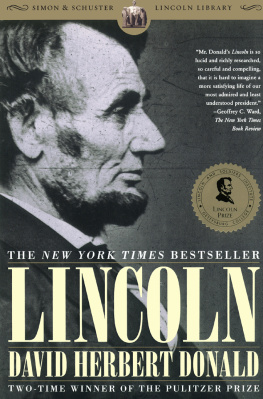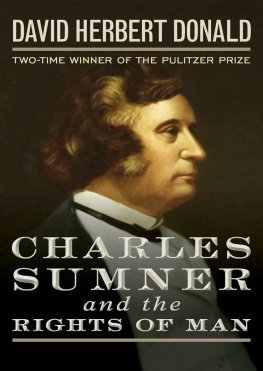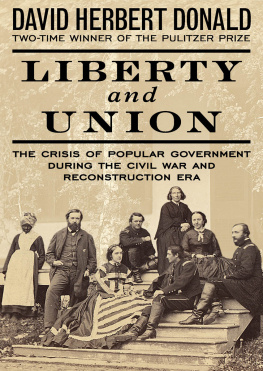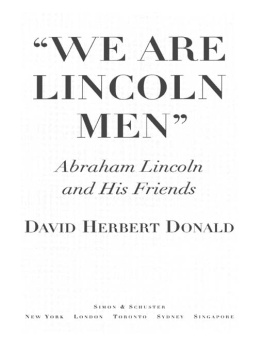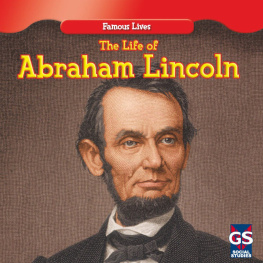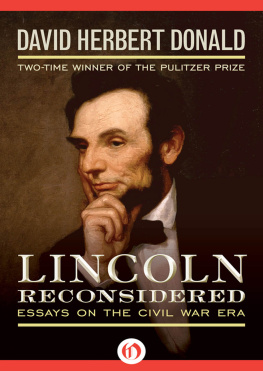
DAVID HERBERT DONALD is the Charles Warren Professor Emeritus of American History and American Civilization at Harvard University. Author of Lincolns Herndon, Lincoln Reconsidered, The Civil War and Reconstruction, and We Are Lincoln Men, and editor of Why the North Won the Civil War, he has twice won the Pulitzer Prize for biography: in 1961 for Charles Sumner and the Coming of the Civil War, and in 1988 for Look Homeward: A Life of Thomas Wolfe . He lives in Lincoln, Massachusetts.

Cover design by David Ter-Avanesyan
Cover photograph The Granger Collection, New York
Author photograph by David Schaefar
Register online at www.SimonandSchuster.com for more
information on this and other great books.

Thank you for purchasing this Simon & Schuster eBook.
Sign up for our newsletter and receive special offers, access to bonus content, and info on the latest new releases and other great eBooks from Simon & Schuster.

or visit us online to sign up at
eBookNews.SimonandSchuster.com
We hope you enjoyed reading this Simon & Schuster eBook.
Sign up for our newsletter and receive special offers, access to bonus content, and info on the latest new releases and other great eBooks from Simon & Schuster.

or visit us online to sign up at
eBookNews.SimonandSchuster.com
ALSO BY DAVID HERBERT DONALD
Look Homeward: A Life of Thomas Wolfe
Liberty and Union: The Crisis of Popular Government, 18301890
The Great Republic: A History of the American People
(with Bernard Bailyn, David Brion Davis, Robert Dallek,
John L. Thomas, Gordon S. Wood, and Robert H. Wiebe)
Gone for a Soldier: The Civil War Memoirs
of Private Alfred Bellard (editor)
Charles Sumner and the Rights of Man
The Nation in Crisis, 18611877
The Politics of Reconstruction, 18631867
Diary of Charles Francis Adams: Volume I, January 1820-June 1825,
and Volume II, July 1825-September 1829
(editor with Ada DiPace Donald)
The Civil War and Reconstruction (with J. G. Randall)
Why the North Won the Civil War (editor)
Charles Sumner and the Coming of the Civil War
Lincoln Reconsidered: Essays on the Civil War Era
Divided We Fought: A Pictorial History of the War, 18611865
(with others)
Inside Lincolns Cabinet: The Civil War Diaries of Salmon P. Chase
Lincolns Herndon


FOR ADA AND BRUCE,
WHO HAVE HAD TO LIVE WITH LINCOLN
FOR MOST OF THEIR LIVES

SIMON & SCHUSTER PAPERBACKS
ROCKEFELLER CENTER
1230 AVENUE OF THE AMERICAS
NEW YORK, NY 10020
www.Simonschuster.com
COPYRIGHT 1995 BY DAVID HERBERT DONALD ALL RIGHTS RESERVED, INCLUDING THE RIGHT OF REPRODUCTION IN WHOLE OR IN PART IN ANY FORM.
SIMON & SCHUSTER PAPERBACKS AND COLOPHON ARE REGISTERED TRADEMARKS OF SIMON & SCHUSTER, INC.
DESIGNED BY LEVAVI AND LEVAVI
THE LIBRARY OF CONGRESS HAS CATALOGED THE HARDCOVER EDITION AS FOLLOWS:
DONALD, DAVID HERBERT, DATE.
LINCOLN / DAVID HERBERT DONALD.
P. CM.
INCLUDES BIBLIOGRAPHICAL REFERENCES (P. ) AND INDEX.
1. LINCOLN, ABRAHAM, 1809-1865.
2. PRESIDENTSUNITED STATESBIOGRAPHY. I. TITLE.
E457.D66 1995
973.7&092DC20
[B] 95-4782 CIP
ISBN-13: 978-0-684-80846-8
ISBN-10: 0-684-80846-3
ISBN-13: 978-0-684-82535-9 (PBK)
ISBN-10: 0-684-82535-X (PBK)
ISBN-13: 978-1-43912-628-8 (ebook)
Frontispiece: Lincoln considered this photograph, made by Alexander Hesler of Chicago in February 1857, a very true one, but Mary Lincoln and others did not like it. My impression, Lincoln said, is that their objection arises from the disordered condition of the hair. (Lloyd Ostendorf Collection)
I CLAIM NOT TO HAVE CONTROLLED EVENTS,
BUT CONFESS PLAINLY THAT EVENTS
HAVE CONTROLLED ME.
Abraham Lincoln to Albert G. Hodges,
April 4, 1864
Contents

Maps
Preface

T he only time I ever met President John F. Kennedy, in February 1962, he was unhappy with historians. A group of scholars had been in the Oval Office hoping to enlist him in a poll that ranked American presidents. I was not one of those visitors, but the next day when I gave a talk in the White House about Abraham Lincoln, the subject was much on his mind. He voiced his deep dissatisfaction with the glib way the historians had rated some of his predecessors as Below Average and marked a few as Failures. Thinking, no doubt, of how his own administration would look in the backward glance of history, he resented the whole process. With real feeling he said, No one has a right to grade a Presidentnot even poor James Buchananwho has not sat in his chair, examined the mail and information that came across his desk, and learned why he made his decisions.
This book was conceived in the spirit of President Kennedys observations. In tracing the life of Abraham Lincoln, I have asked at every stage of his career what he knew when he had to take critical actions, how he evaluated the evidence before him, and why he reached his decisions. It is, then, a biography written from Lincolns point of view, using the information and ideas that were available to him. It seeks to explain rather than to judge.
My biography is based largely on Lincolns own words, whether in his letters and messages or in conversations recorded by reliable witnesses. I have tried as far as possible to write from the original sourcesthat is, from firsthand contemporary accounts by people who saw and talked with the President. Of course, I have consulted the voluminous secondary literature, but I have used it chiefly for letters and documents that I could not find elsewhere. My approach was made possible by the availability of the Abraham
The results of my inquiries can most readily be defined in negative terms. This book is not a general history of the United States during the middle of the nineteenth century. I have stuck close to Lincoln, who was only indirectly connected with the economic and social transformations of the period. It is not even a history of the Civil War. There is, for example, almost nothing in the following pages about the internal affairs of the Confederacy, because these were matters that Lincoln could not know about. It is not a military history; I have not described campaigns and battles that Lincoln did not witness. I have not offered a broad philosophical discussion of the origins of the Civil War and I have not addressed the question of whether it was the first modern war. These are important subjects, but they did not present themselves to Abraham Lincoln in any practical way. I have not asked whether Lincoln freed the slaves or the slaves freed themselves, because Lincoln never considered these roads to emancipation as mutually exclusive. Certainly he knew that thousands of slaves, in individual heroic acts of rebellion, were leaving their masters to seek freedom behind the Union lines, but he also knew that ending the institution of slavery required official action on the part of the United States government.
Next page
